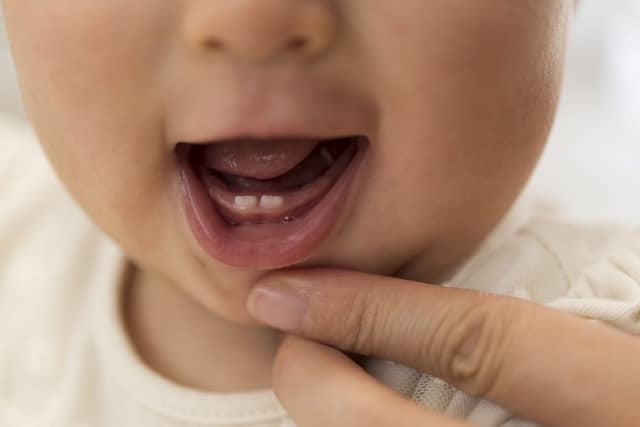Everyone’s born with deciduous teeth in their gums. Infants can start teething at six months, with their first tooth pushing through the gums. This is the reason many people call deciduous teeth baby teeth. Children start with 20 baby teeth, and they begin losing teeth when they’re six or seven years old, making way for their permanent teeth.
Experts in children’s dentistry treat children. Pediatric dentists specialize in dental issues affecting children and learn how to treat children with baby teeth or a combination of baby and adult teeth. Your kid’s dentist is equipped to address various dental issues and can help you determine which pediatric cavity treatment is best for your child. You can use the information here to answer your questions about treating cavities in children and learn how to prevent cavities.
Should Cavities in Baby Teeth be Treated?
Although children only have their baby teeth for six to 12 years, caring for these primary teeth is crucial. Cavities should be treated immediately because prompt treatment can prevent infections from spreading, reduce treatment costs, and may reverse the damage if caught early.
What Are Cavities?
A cavity is an area where a tooth has started to decay. Visible white spots on teeth are the first signs of tooth decay. At this stage, the tooth’s enamel is still intact, but during stage two, damage from the cavity creates a hole in the enamel. In stage three, the cavity reaches the dentin, the layer below the enamel.
Stage four cavities have reached the tooth’s pulp, affecting the tooth’s nerves. Without treatment, the cavity reaches stage five, infecting the gums and bones proximate to the tooth’s root.
Causes of Childhood Cavities
Developing cavities is referred to as demineralization because tooth enamel loses its minerals, causing the enamel to weaken. Demineralization starts with eating or drinking, when food particles get on the teeth. These food particles remain after eating and combine with the person’s saliva, creating plaque. During this stage, fructose develops. Bacteria process the fructose, creating lactic acid. This acid can cause cavities and gum disease.
Childhood Cavity Prevention
Preventing cavities begins with an effective oral hygiene routine. Brushing teeth after meals or snacks removes food particles from teeth, an effective way to keep your child’s mouth plaque- and cavity-free. Introduce flossing at the age of two and floss regularly to remove food particles between the teeth.
The types of foods people consume also affect their chances of developing cavities. Reducing your child’s sugar intake reduces their risk of cavities. Processed starches, such as white bread and pasta, also increase the risk of developing plaque and cavities.
Fluoride is a powerful cavity-prevention tool. Fluoride can remineralize teeth and strengthen tooth enamel, preventing enamel from breaking down. Using fluoride toothpaste and drinking water with fluoride can help prevent cavities.
Regular dental checkups are another vital part of a cavity prevention strategy. Dentists can see what’s going on with teeth in the back of the mouth, ensuring they catch early signs of tooth decay. Your pediatric dentist can also apply dental sealants to protect baby teeth from developing cavities.
Baby Teeth Cavity Treatment Options
The treatment options depend upon the cavity’s stage of development. During the first stage, when white spots appear, it’s possible to reverse the damage with good dental hygiene. Remineralization can restore the calcium and phosphate that are missing.
Stage two cavities are irreversible. Regular dental treatment options include:
- Fillings
- Bridges
- Crowns
- Onlays
- Veneers
Children may need oral surgery to address stage four or five cavities. These teeth may need to be extracted. A root canal is another treatment option for stage four or five cavities.
What happens if you don’t treat cavities in baby teeth?
Cavities progress through the five stages of development without treatment. While remineralization or fillings can stop cavities in stage one or two, the infection causing these cavities will worsen without treatment. Children with stage three cavities will experience tooth pain, which worsens if the cavity reaches the nerves.
Without intervention, cavities reach stage five. Treatment options include a root canal or tooth extraction. Without treatment, infections from stage five cavities can spread and cause sepsis, which can be fatal.
Losing teeth impacts a person’s appearance and bite. It isn’t an option for young children to get dental implants to compensate for missing baby teeth because dentists don’t install implants until the jaw is fully developed, which doesn’t occur until the late teen years.
Do Cavities In Baby Teeth Affect Permanent Teeth?
The cavity’s severity determines whether cavities in baby teeth affect permanent teeth. Since stage one cavities can be reversed if caught early, they’re unlikely to affect permanent teeth.
Since fillings usually treat stage two cavities, preventing long-term damage is possible. As long as the cavity is successfully treated and the infection is stopped, it shouldn’t affect permanent teeth.
The farther the infection spreads, the greater the chances the cavities will affect your child’s permanent teeth. Tooth extraction poses a significant risk because losing a tooth affects tooth alignment, and missing baby teeth can cause permanent teeth to be crooked when they emerge. Missing baby teeth can also lead to crowding. People with crowded or crooked teeth may need braces to correct their tooth alignment.
Choosing the Right Treatment
Have your child’s pediatric dentist examine their teeth. Dentists perform manual examinations, look for sensitive areas in the mouth, and use X-rays to diagnose cavities. Your child’s dentist can determine the cavity’s stage and the best treatment options for your child. Visit our appointment page to book your child’s dental checkup to prevent and treat cavities. We’ll answer your questions, provide dental hygiene tips, and deliver the expert care your child needs to protect their teeth for years to come.
Sources
Brennan, D. (2021). Cavities in Children: What to Do.
Douglass, J.M., et al. (2004). A Practical Guide to Infant Oral Health.
Tooth Abscess. (2022).



